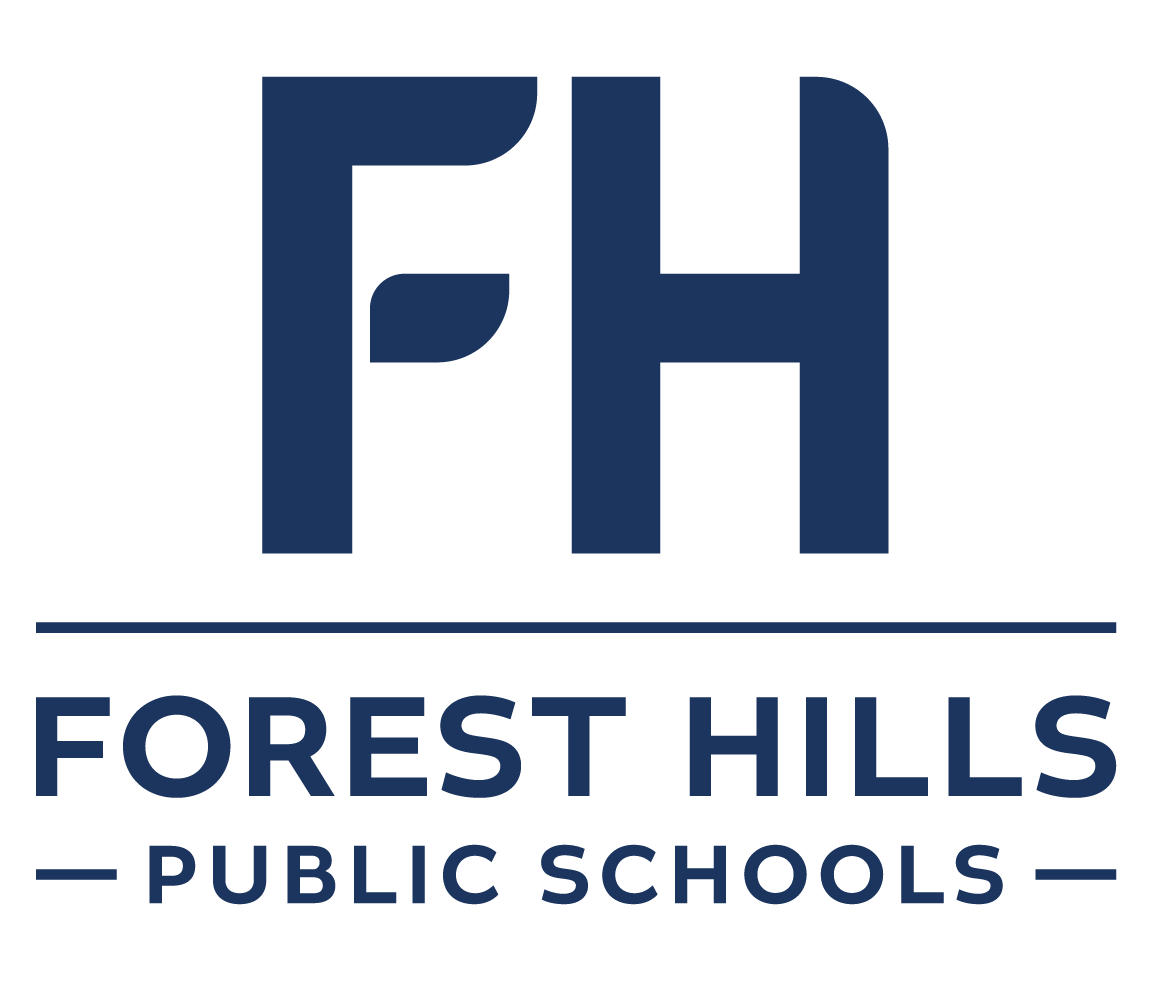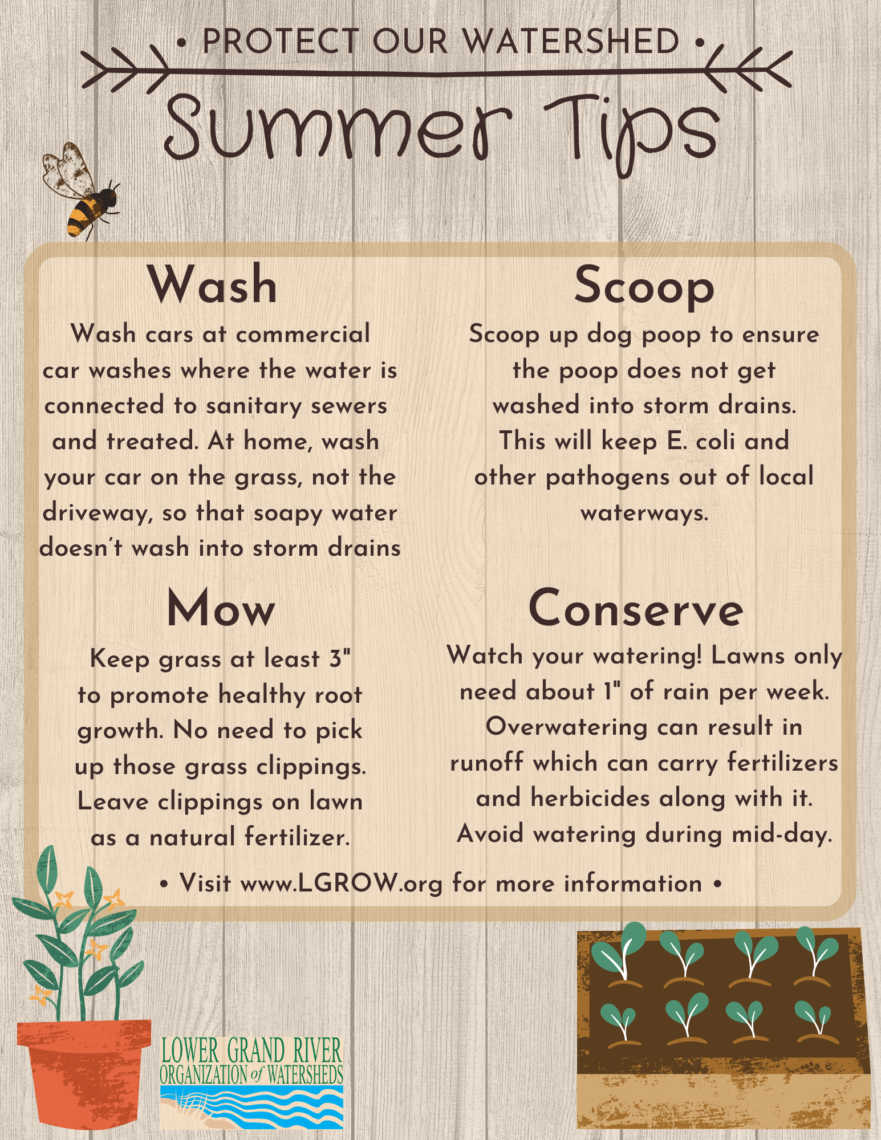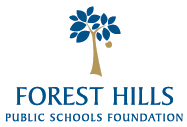Public Education
Summer Tips to Protect our Watershed
Wash
Wash cars at commercial car washes where the water is connected to sanitary sewers and treated. At home, wash your car on the grass, not the driveway, so that soapy water doesn’t wash into storm drains.
Scoop
Scoop up dog poop to ensure the poop does not get washed into storm drains. This will keep E. coli and other pathogens out of local waterways.
Mow
Keep grass at least 3″ to promote healthy root growth. No need to pick up those grass clippings. Leave clippings on lawn as a natural fertilizer.
Conserve
Watch your watering! Lawns only need about 1″ of rain per week. Overwatering can result in runoff which can carry fertilizers and herbicides along with it. Avoid watering during mid-day.
Visit www.LGROW.org for more information
Waste & Single Stream Recycling
FHPS provides separate waste and recycling dumpsters at all facilities. All recycling dumpsters allow single stream recycling which allows us to recycle more, reduce the waste going to landfills, and in turn, save money!
- Our recycling dumpsters are clearly marked and allow collection of the following unbagged items:
- Newspaper
- Office paper
- Magazines
- Books (hard or soft covered without plastic covers)
- Corrugated cardboard and unlined/unwaxed boxboard
- Metal containers (tin and aluminum)
- Rinsed glass containers
- Rinsed plastic containers (#1-#7, and not motor oil or solvent bottles))
- Electronics should be recycled in bins provide by FHPS technology.
- Any items not identified above ( ink/toner cartridges/batteries/styrofoam) should be recycled separately or placed in the waste bins.
- Pickups are scheduled to avoid student, staff and visitor traffic, and are monitored throughout the year to reduce the number of trips made to our sites.
Stormwater Management
Throughout the district, Forest Hills Public Schools maintains an extensive storm sewer infrastructure to effectively manage and control stormwater runoff. The associated detention areas, drainage swales, catch basins and underground systems are necessary to provide public safety, convenience, and the protection of property at a local and regional level.
FHPS takes an active role in protecting these resources through effective stormwater management planning and practices and works closely with the Lower Grand River Organization of Watersheds (LGROW) and the Grand Valley Metro Council to obtain and manage a stormwater discharge permit that is required by the U.S. Environmental Protection Agency and the Michigan Department of Natural Resources.
This permit is required under Section 402 of the Federal Clean Water Act, as amended, and under WaterResources Protection (Part 31, Act 451, PA 1994) of the Michigan NaturalResource and Environmental Protection Act (NREPA), as amended.
This permit requires us to coordinate our property development and maintenance through best management practices that are used throughout the region during and after construction to prevent or minimize water quality impacts from stormwater runoff.
For more information on what you can do to promote and maintain a healthier West Michigan watershed, visit the sites below!
- Stormwater Educational Information from LGROW
- Specific documentation of FHPS permits and stormwater planning information
Disposal of Sensitive vs. Non-sensitive Documents
In the past, it has been assumed that if there are ANY documents (including textbooks and library books) that need to be disposed of, they should be shredded. This is correct in the case of SENSITIVE documents, but not ALL documents.
The outlined process will allow you to make the best decisions for disposal of the materials from a philanthropic, environmental and financial standpoint. It will also minimize time that the materials will remain at your site waiting for disposal.
Sensitive Documents
Any documents that are to be disposed of that contain student or staff records or sensitive District information, need to be shredded.
Follow the process below:
- If you have a small number of boxes (1-6), send them via the courier to Operations and we’ll store them for shredding at our site.
- If you have a larger number of boxes, contact Shred-It at 800-697-4733 for on-site shredding or pickup of the documents. Note: They will want an accurate estimate of the number of boxes so that they can provide the correct equipment, and you will need to budget in approximately 1 week for coordination.
- You will receive a receipt for the documents that are shredded. Please forward the receipt and invoice to Operations for payment.
Non-sensitive Documents
Shredding of documents is the highest cost alternative, and many of the documents that are currently being requested to be shred are of a NON-SENSITIVE nature, and can be disposed of more responsibly. Below are the options currently available:
- Donation: If the documents are library or text books that may still be of value to an outside party, contact Better World Books (http://www.betterworldbooks.com) and follow their process to donate the materials. They will send shipping materials, and a portion of their proceeds are provided to FHPS as well as one of their non-profit literacy programs. CHS has successfully used this method in the past and Chris Patrick has offered to help coordinate this process with you. We will add to this list if we are made aware of any other viable recipients in the future.
- Recycling: Paper Gators dumpster are located at buildings throughout the District. If you have a Paper Gator dumpster on site, put the materials in it. If not, drop-off the materials at any of the FHPS Paper Gators nearby. Newsprint, catalogs, magazines, junk mail, phone books, office/school paper and both hard and soft cover books can be recycled. This program provides funding for our schools, and keeps the paper based products out of our landfills. For more program information, go to http://papergatorrecycling.com/. Note: Covers can remain on the books, but if there are plastic covers that can be removed please do so prior to disposal. Also, if the dumpsters will be filled, contact Paper Gator directly in advance to coordinate disposal.
- Disposal: If either of the above methods do not work, utilize the dumpsters at your building. Note: With the materials going to the landfill, this is the least environmentally sensitive method for disposal.






